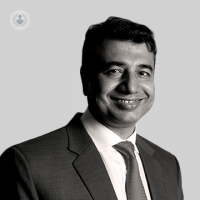Treating back pain with percutaneous laser disc decompression
Written in association with:Back pain, one of the leading causes of disability worldwide, especially lower back pain and sciatica can be caused by a herniated disc. A herniated disc is where a disc in the spinal disc puts pressure on the nerves causing pain in the back and down along the leg.
Mr Malik, one of the UK’s leading minimally invasive spinal surgeons and member of the London Neurosurgery Partnership who introduced endoscopic spine surgery to the UK, talks about percutaneous laser disc decompression (PLDD), a fairly new technique to treat back pain, in particular, sciatica.

What is PLDD?
PLDD is a minimally invasive procedure whereby a micro needle is inserted into the nucleus (centre) of the disc, using X-ray guidance. A thin fibre is inserted through the needle into the disc to deliver laser energy to the centre of the disc. The thermal energy of the laser heats the disc, excess water evaporates and the disc shrinks in size, releasing the pressure caused by the disc leaning on the nerve. The pressure reduction then results in pain reduction.
What can PLDD be used to treat?
Percutaneous laser disc decompression is mostly used to treat the following:
- Sciatica and lower back pain
- Refractory back pain
- Annular tear
- Disc that is causing compression on the root of a nerve
- Used when conservative treatments like pain management and physio fail to treat the pain
What are the benefits of PLDD?
Other than treating back pain, PLDD is performed under local anaesthetic, which means you don’t have to be put to sleep. Rehabilitation is very quick and patients can go home the same day as the procedure.
The procedure is also minimally invasive, so it doesn’t require any large incisions or disruption to muscles, as in the case of open spine surgery. This also means that there will be no epidural scarring, as the procedure avoids major open surgery.
If back pain is something you or someone you know is struggling with, get in touch with Mr Malik for a full consultation.


